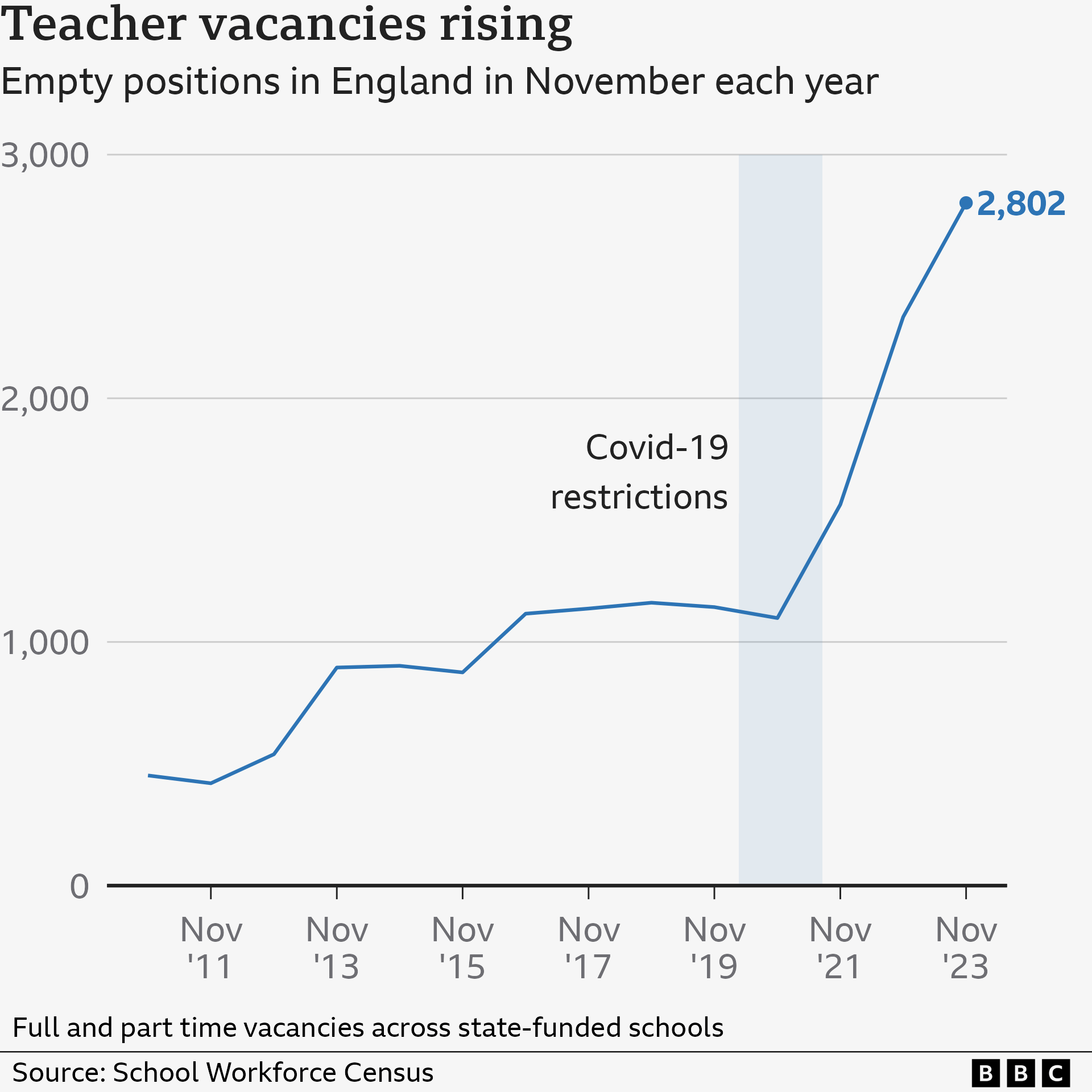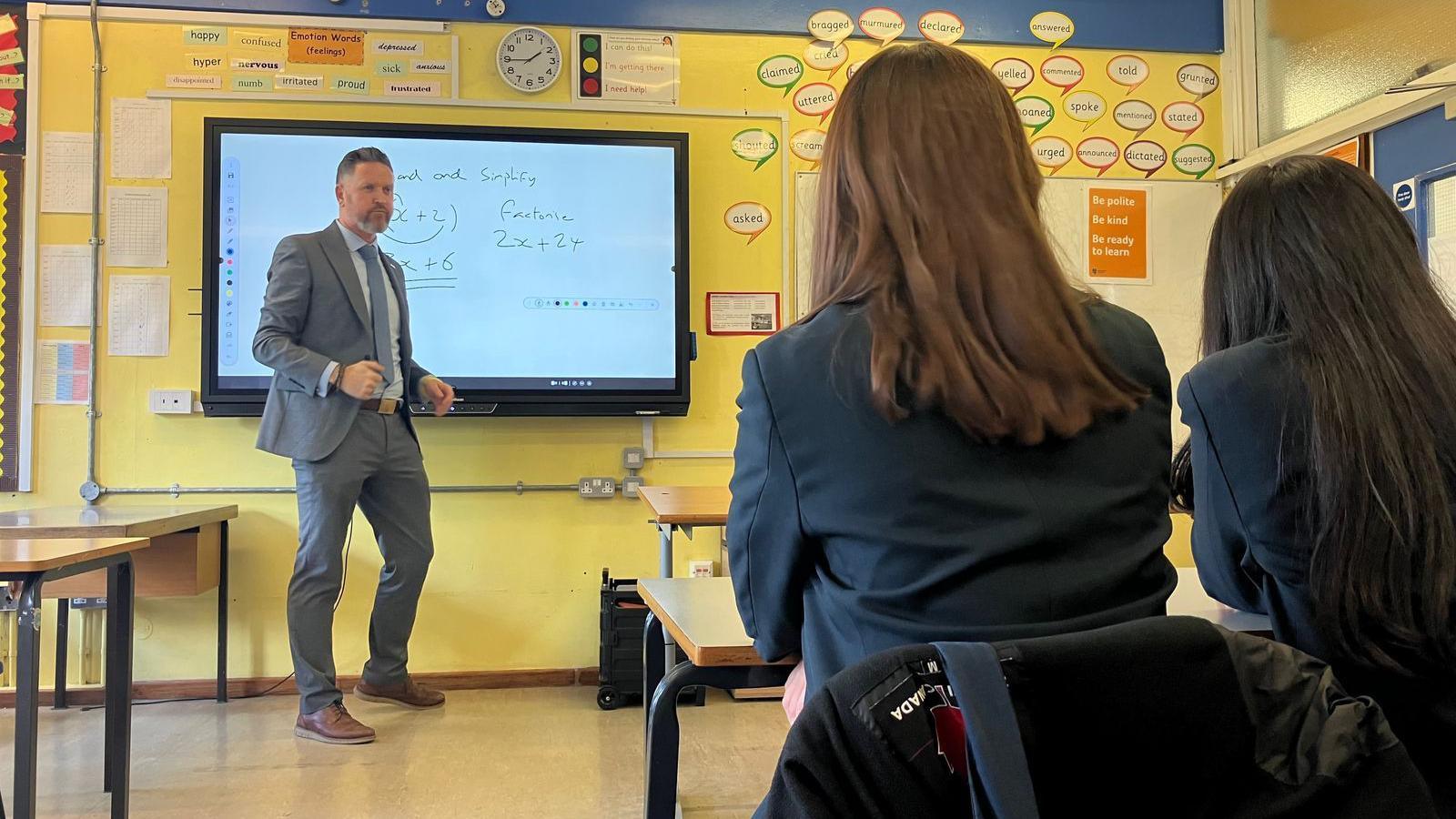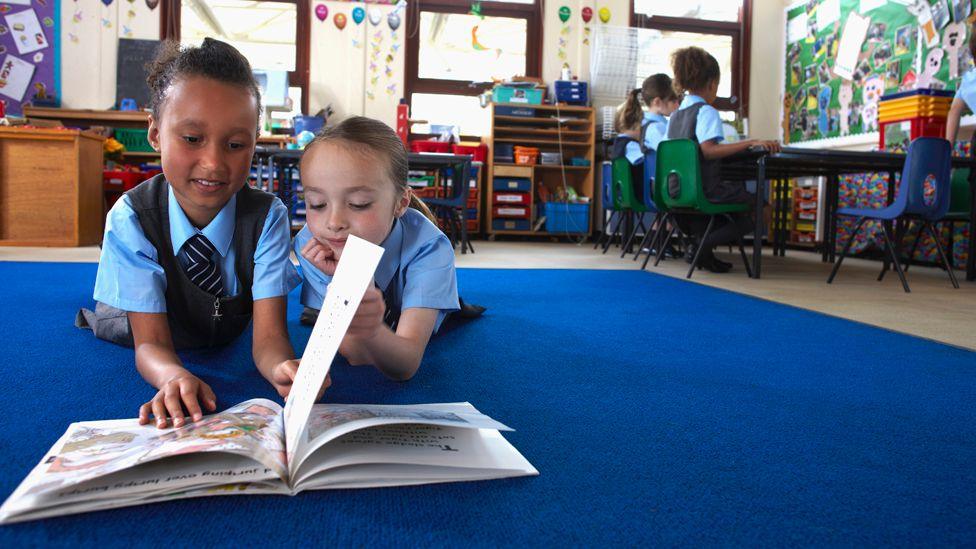Would a 1.40pm Friday finish stop teachers quitting?

Tyra Packer's anxiety has "completely disappeared" since she quit teaching
- Published
The number of empty teaching posts in England has more than doubled in the past three years, the latest official figures reveal.
The number of teachers has risen - but so has the number leaving. And the number of vacancies per 1,000 teachers has risen from two to six.
The government has missed its target for recruiting teacher trainees for nine of the past 10 years.
At the start of this school year, the current, Conservative, government raised teachers’ starting salaries to £30,000 to try to encourage new trainees. Labour has promised to recruit 6,500 more teachers if it wins the general election, next month. The Liberal Democrats have also said they would invest in schools and teachers.
Giving teachers an early finish on a Friday or a day off every other week are among the ideas schools are considering to encourage teachers to stay.
'Mentally drained'
Tyra Packer, 29, a primary-school teacher in Southend-on-Sea, Essex, for seven years, left the profession last summer, to protect her physical and mental health.
She had been feeling anxious, at home, often in the middle of the night, and then at school, despite the support of her colleagues.
As a classroom teacher but also phonics and PE lead, Miss Packer felt unable to properly fulfil any of her roles - often working well into the evening.
“You're tired - you're also mentally drained," she says. "But yet you're coming home and making sure those reports are done, you've sent those emails, you've organised that school trip - always feeling like you’re running on empty.”
She started relying on toast and ready meals instead of “making a decent dinner” - and it became “really difficult” to find time to look after herself.
PE teachers retrain in maths to fill school gaps
- Published20 March 2024
Solihull teachers to be given one day off a fortnight
- Published22 March 2024
Miss Packer had “mixed emotions” when she quit her job but has since seen marked improvements to her health.
She now runs a small baking business, making "chunky cookies" and celebration cakes and hosting children's workshops.
“My anxiety has probably completely faded since leaving school, something I noticed instantly," she says.
“I definitely sleep like a baby now.”
The annual figures, external, released by the Department for Education on Thursday, cover the academic year 2023-24.
On top of rising vacancy rates, they also reveal the proportion of state-school teachers leaving the sector is at its highest since 2010 - 39,971 (8.8%) left in 2022-23, not including those who died or retired.
In a report in May, external, MPs on the Education Select Committee said teacher recruitment and retention had been a “persistent challenge for over a decade” and “while there have been welcome increases in absolute teacher numbers, these have not kept pace with pupil numbers”.

At Springwest Academy, in west London, school finishes early on a Friday - to prioritise teacher wellbeing.
Principal and maths teacher Simon Hart, 44, says this is key to providing the best outcomes for his pupils - many of whom are from disadvantaged backgrounds.
About five years ago, the school timetable was rejigged so lessons run from 09:00-16:00 Monday to Thursday, with twice-weekly staff meetings before they begin.
And these longer days allows school to end at 13:40 every Friday.
Students and staff “love it”, Mr Hart says.
And he wants schools to “catch up” with private-sector jobs that have better salaries and more flexible working.

Principal and maths teacher Simon Hart loves it when his teachers use their slightly lengthened weekends to go on city breaks - as their school is near Heathrow Airport
"There are teachers at Springwest, making a difference, who could earn triple the salary and work from home,” Mr Hart says.
He hopes the next government will help schools make teaching more attractive, supports other schools trialling a nine-day fortnight and wants teachers to be able to enjoy a three-day weekend “by the time I retire”.
Springwest is fully staffed - but this year, filling some roles in specialist subjects - such as religious education, history and geography - has been “difficult”, Mr Hart says.
English teacher Hafsa says early Friday finishes help everyone's mental health.
"It leaves students and staff refreshed and ready to come in on that Monday knowing that they've got a little bit of elongated weekend ahead of them," she tells BBC News.
The school's culture of kindness also protects her mental health.
She had found lesson planning "really daunting" - but sharing plans, and a rigorous behaviour policy run by senior leaders, have kept down her workload.
Next year, her second in the profession, Hafsa, 22, will become deputy head of English - and she now plans to stay in education for the "foreseeable future".
“One of the things that makes me want to stay in the profession is seeing the impact first hand I’m having on the students,” she adds.
Miss Packer, however, is unconvinced early Friday finishes would be enough to keep people in the profession.
“That would definitely help," she says.
"But it would be naive of senior-leadership teams to think that that is going to completely solve the issue of teacher stress and wellbeing.”
National Foundation for Educational Research lead economist Jack Worth said the number of empty teaching posts, and those being filled temporarily, was now "the highest it's been since comparable records began, in 2010".
And a key challenge facing any incoming government would be making a teaching career more attractive, financially and otherwise, to ensure there were enough high-quality teachers in schools.
'Work-life balance'
The government raised starting salaries at the beginning of this school year, as well as having “levelling up” payments of up to £3,000 for some teachers in shortage subjects.
Labour has announced plans take forward the recommendations of the Teacher Workload Reduction Taskforce, external, “to give staff a better work-life balance”.
Shadow education secretary Bridget Phillipson said Labour would "put education at the heart of national life" by "valuing the school workforce".
Liberal Democrat education spokeswoman Munira Wilson said: "Every child deserves the chance to flourish - and that means investing in great schools and teachers."
Additional reporting by Nadyne Dunkley and Harriet Agerholm.
Related topics
- Published4 June 2024

- Published29 May 2024

- Published16 May 2024

- Published30 May 2024
